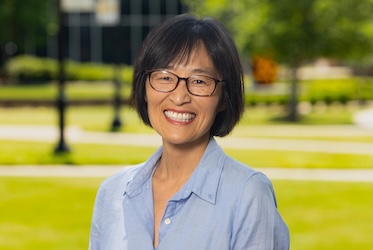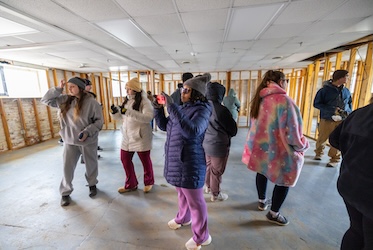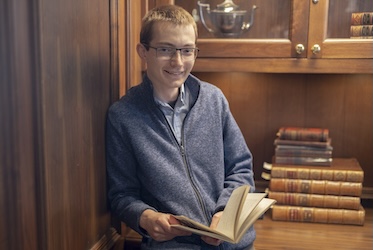
KSU education students prepare for changing classroom
KENNESAW, Ga. | Mar 8, 2023
Education is one of those unique fields in which many describe their choice to become a teacher as a calling. Their passion has given them the strength to weather many challenges. However, over the past two years, most specifically due to COVID-19 and other stressors in the classroom, teachers have been considering leaving the profession at higher rates than in years prior.
While the challenges remain, the next generation of educators in Kennesaw State’s Bagwell College of Education are hopeful and ready to make a positive impact.

Brittany Aguilar, senior
Acworth native Brittany Aguilar said she’s known she wanted to work with children since she was young.
The early childhood education major said her passion for education began when she decided as a young student that she wanted to be a teacher who could represent the Latinx community and give other Spanish-speaking students someone to look up to.
“I want to add to that percentage of teachers who are coming from minority backgrounds,” Aguilar said. “It’s important for students to see their own culture reflected in their education.”
Aguilar is active in organizations focusing on cultural awareness, including KSU Latinx Teachers and Recruitment, Retention, and Progression to Graduation for Hispanic and Latino Students. She recently received an award for summer research that explored the teaching of math to elementary students in both English and Spanish.
Aguilar said she isn’t concerned about there being a robust next generation of teachers because of the range of skills she and her colleagues have picked up in their coursework. Not only is she ESOL (English to Speakers of Other Languages) endorsed, but she says KSU’s instructional tech classes have given her confidence with classroom technology, enough to have her sights set on a master’s degree in the subject.
“I know there will be lots of challenges in the future, but I’m so passionate and so are most teachers because we understand how important the work is,” Aguilar said. “It’s hard to put into words, but besides family, we know we are the first people who will have a large impact on students’ lives.”
Erik Vu, senior
Erik Vu, an early childhood education major from Riverdale, Georgia, wasn’t always sure he’d be a teacher. But volunteering in a kindergarten class with his sister a few years ago ignited his passion for educating youth.

“To hear students tell me that they understand and feel they can complete a task after learning something new makes me happy,” he said. “Being part of that was special.”
Through student teaching, Vu said he has only become more passionate. He said he understands the challenges that face him as a future teacher but said he is not discouraged.
“I think it’s important for teachers to continue doing what they do because they represent a bridge to support and guide students into a successful future,” Vu said.
Equally important, he said, future teachers will need to be empathetic, flexible and equipped to support students academically, but also emotionally.
Vu worked alongside Aguilar in Bagwell’s Fast Start Academy, where program coordinators said the two went above and beyond, building relationships with local students who needed extra support reaching their literacy goals.
“I’ve learned to create lessons that supported all students, whether that means students with disabilities, English learners, gifted students or students who just need some extra support,” Vu said. “I want to be a teacher who tries to understand what the student is experiencing and can give them what they need.”
Mariyah Richardson, junior
Mariyah Richardson, a junior and early childhood education major, said her love of teaching comes from her passion for inspiring others.

But inspiring others took on a new meaning for her when she was a student teacher.
“I had a student come up to me and say, ‘Wow, I like your skin,’ which made me realize that I was probably the first Black teacher she ever had and what it meant to her to see someone in my role who looked just like her,” Richardson said.
A Bagwell ambassador and member of several on- campus organizations, including Black Teachers Matter and Black Wall Street, Richardson hopes that her membership in these organizations will serve to support other Black students.
“On campus, being involved helps me be a better educator. People feel like they can come to me to ask questions or confide in me,” Richardson said.
Professors say Richardson is a passionate advocate for education and is inspiring those who are next in line to become teachers. She was one of the featured panelists during a recent “Educators of Tomorrow” event, where she spoke to more than 250 high schoolers interested in becoming teachers.
Looking toward her career in education, Richardson said she understands feelings of burnout from teachers who have been pushing through the past two years of obstacles to a normal school year. But she said she’s ready to face what challenges may come and maintains it’s important to inspire the next generation of teachers, and other vocations, by example.
“We inspire these kids to be what they want to become,” she said. “Without educators, there would be no doctors, no lawyers. In order to get to those careers, you have to get through us.”
KSU preparing next generation of teachers
Though he acknowledged the challenges and recent surveys that show higher-than-normal numbers of teachers who are considering leaving the profession, Adrian Epps, dean of the Bagwell College of Education, said he is still optimistic.
We have several initiatives focused on recruiting, developing and nurturing educators of tomorrow as evidenced by our bachelor’s degrees and our Master of Arts in Teaching,” he said, adding that KSU’s professional development and advanced degree offerings aim to help public schools retain their star educators.
Meanwhile, Brian R. Lawler, interim director of the Center for Innovation in STEM Education Research and associate professor of mathematics education, said recent surveys on KSU’s campuses mimic results of national surveys from 2017, which showed nearly half of college STEM majors were considering a K-12 career path. He said that the recent KSU data is encouraging and provides a pool of teaching candidates outside education majors.
Lawler said he’s also seen a newfound enthusiasm from education students who made their way through college during COVID-19. He said they appear to be focusing their attention on collaboration with colleagues and relationships with students.
“The pandemic showed us and our students that we can do a pretty good job of teaching online, but it also reinforced the importance of relationships,” he said. “The result of those challenges is that our students are prepared for what comes.”
Epps added that there are still many challenges, especially in public education.
“At KSU, we are exploring how our public education systems can better acknowledge the ways educators go above and beyond. Teachers have shown how resilient they can be, but we need to continue to find creative solutions to support them because our future is truly in their hands.”
This article first appeared in the current issue of Kennesaw State University Magazine.
– Thomas Hartwell
Photos by Darnell Wilburn, Matt Yung, submitted
Related Stories

Kennesaw State professor earns Mid-Career Award from American Educational Research Association

Kennesaw State architecture, engineering students reimagine Asheville's devastated River Arts District

First-year Kennesaw State student, author recognized as versed local historian

Construction starting on Kennesaw State's newest residence hall
A leader in innovative teaching and learning, Kennesaw State University offers undergraduate, graduate, and doctoral degrees to its more than 47,000 students. Kennesaw State is a member of the University System of Georgia with 11 academic colleges. The university’s vibrant campus culture, diverse population, strong global ties, and entrepreneurial spirit draw students from throughout the country and the world. Kennesaw State is a Carnegie-designated doctoral research institution (R2), placing it among an elite group of only 8 percent of U.S. colleges and universities with an R1 or R2 status. For more information, visit kennesaw.edu.














